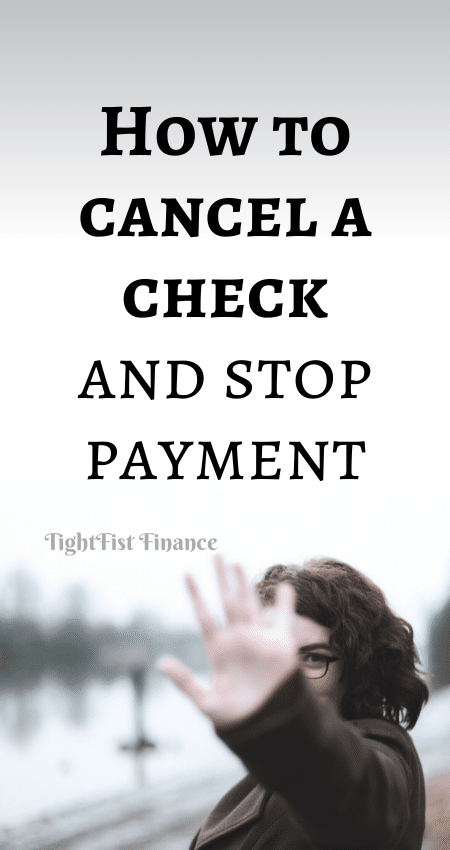How do you cancel a check and stop payment?
Checks that have not been deposited can be canceled with a stop payment by contacting your bank. Your bank will request information on the check, fill out a form, and charge a fee (typically $30) to stop the check. Stop payments will typically last between 6-12 months.
Imagine, sending a check for goods or services that you never received. What if you sent a check, but realized you might be charged an overdraft fee due to insufficient funds?
Fortunately, it is possible to cancel a check before the money is deposited.
Luckily for you, I’ll show you how to stop payment on a check. I’ll show you how long you have to cancel a check, the reasons to stop payment, and how much it will cost you. You can rest easy knowing your money is safe!

This article may contain affiliate links which pay a commission and supports this blog. Thank you for your support!
Can you cancel a check before it’s cashed?
It is possible to cancel a check before it’s cashed by contacting your bank and asking to stop payment. You cannot stop payment on a check after the check has been cashed, so take action immediately. Some forms of payment, such as a cashiers check, cannot be stopped.
There are plenty of reasons to stop payment on a check. The most common reasons are lost or stolen checks, writing the wrong amount, or insufficient funds in your account. You may also be disputing payment over services or goods received or sent the check to the wrong address.
Checks cannot be canceled with a stop payment after the check has been deposited. The payment has already been processed and the transaction cannot be reversed. Instead, contact the person who cashed the check to resolve the issue.
Cancelling a check is legal and a service offered by many banks, credit unions, and financial institutions. However, you are still responsible for paying for goods or services that you have received.
Can you cancel checks online?
Some banks will have an online form for you to fill out in order to stop a payment on a check. You may need to fill out this form before the bank will perform a stop payment.
Click to Tweet! Please Share!Click To TweetHow do you cancel a check and stop payment?
To cancel a check and stop payment, verify the check has not been processed by logging into your online banking. Call your bank and ask to stop payment on a check. Your bank may request information about the check, have you fill out a form, and charge a fee to stop payment.
The first step is to verify the check has not been processed. A check that has already been processed or cashed cannot have a stop payment against it. You can check the status of the check by logging into your online banking.
Next, call your bank and ask them to stop payment on the check. Your bank may ask for your photo identification, check number, check amount, account number, and recipient’s name.
The bank may ask you to fill out a stop payment form online. Typically, the bank may put a temporary stop payment on the check until the form is received. This temporary stop payment should expire after a couple weeks.
Once you’ve provided the bank with necessary information, they will flag the check to stop payment. A stop payment will typically last between 6 to 12 months. At this point, you should contact the payee and notify them of the stop payment.
How long do I have to cancel a check?
You can cancel a check as long as it has not been cashed yet. Once a check has been cashed, the payment has been processed and you may no longer cancel the payment. Therefore, it is important that you attempt to cancel a check as soon as possible.
How much does it cost to cancel a check?
The average cost to cancel a check is around $30. Some banks will cancel a check for free, but the majority of banks charge between $15 and $35.
Click to Tweet! Please Share!Click To TweetSummary: Cancel a check and stop payment
As you can see, it is possible to cancel a check and stop payment. You can only cancel a check that has not been cashed or deposited yet. Stop a payment by contacting your bank and providing the check details.
Some banks will have you fill out a form to start the process of stopping payment. Your bank may place a short stop payment on the check without the form. Stop payments on checks will typically last between 6 months to one year.
Expect to pay around $30 in fees to cancel a check. Most banks charge for this service and the typical fee ranges between $15 and $35.
Recommended
Based on this article, we think you’ll enjoy the following:
- What is a third party check
- Where can I order checks?
- Can I deposit a check for someone else?
- How to endorse a check over to someone else (e.g. third party)
- How to make and print your own checks
- What is a single vs duplicate check? Which is better?
- How to write a check to yourself for cash
- How to get a cancelled check
- Can you cash someone else’s check?
- What happens if I cash a bad check?
- Can I cash or deposit an old check?
- How old do you have to be to cash a check